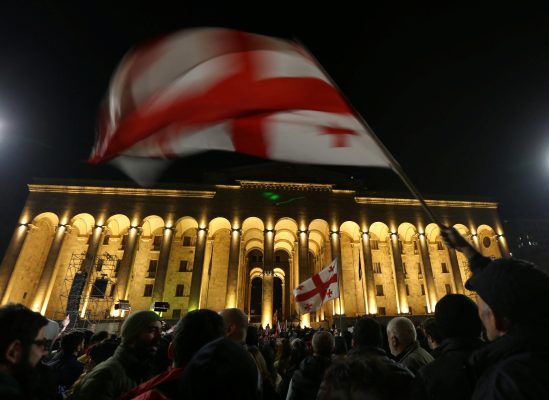Ten years ago, the typical Ukrainian would say, “It is the system, I cannot alter it,” as yet another tale of high-level graft reached their ears.
Russia’s invasion has changed that, and I do not think it can be changed back. My friends and compatriots are fighting and dying in a war of national survival. Vladimir Putin and his generals seek to erase Ukraine from the map, to make us a colony of the Moscow kleptocracy — people who are no better than common criminals and behave in just that way (look at the stolen grain shipped to help the regime in Syria, or the looted homes and museums of Ukraine.)
Ukraine fights for so many reasons, but one is to build a country without this thief mentality. All of us — those who defend the country on the frontline, or other fronts; fundraise money for a drone; or collect clothes for internally displaced people affected by the war — want to feel that everyone is working for a better future and victory over the aggressor. This victory is not possible if old schemes and corruption prevail.
Of course, we have been here before. There was the Revolution of Dignity in 2014 and anti-corruption reform afterward, which has tried to root out corruption in all branches of government ever since. Was it working? It was, but too slowly.
In December 2021, just a few months before the full-scale invasion by Russia, Ukrainians considered corruption one of the country’s biggest problems. A survey ordered by the National Agency for the Prevention of Corruption showed that Ukrainians saw the top three issues for the country as the high cost of living and low incomes (94.2%), hostilities in Donbas (92.8%), and corruption (91.6%.)
Moreover, almost all respondents (94.4%) considered political graft at the highest level (for example, in the government or the parliament, the Verkhovna Rada) to be a quite serious or very serious problem. More than three-quarters of the respondents believed corruption in business (for example, when businesspeople and officials interact) to be a serious problem (85.3%) and likewise everyday domestic corruption, for example, in schools and hospitals (76.2%.)
So, when in January-February 2023, a series of scandals were uncovered showing possible corruption at the highest level, we were disgusted. It is obviously not the first time journalists or activists have tracked down and published stories about graft. But it is the first time it has happened in wartime. In peacetime, we saw these stories and hoped that “one day” the system would get better. Now our soldiers and pilots are dying for that “one day,” a day that thousands will never see. The response was one of anger, frustration, and hatred.
We learned about scandals across the government, including customs, tax, the Ministry of Defense (MoD), and the Ministry of Infrastructure. According to journalists, the MoD purchased food for servicemen at prices two to three times higher than in Kyiv stores. Then there was news about officials who bought almost 3,000 bulletproof vests for Ukraine’s armed forces, which turned out to be of poor quality. Later we saw footage of thick wads of hryvnias and dollars being pulled from the sofa of an official suspected of procurement fraud. Another target of the investigation, Vasyl Lozynskyi, Ukraine’s deputy infrastructure minister, was detained for allegedly embezzling $400,000, money he was said to have been given for purchasing generators and other equipment at greatly inflated prices.
Oleksii Symonenko was Ukraine’s deputy prosecutor general when he went on vacation in Spain during the war and while martial law remained in force, while the acting head of Kyiv’s tax authority was found to own four homes, two cars, designer clothing, and had $158,000 at one apartment, along with high-end gold watches. The list of scandals would be incomplete without reports about raids in various government buildings and houses of high-profile ministers and oligarchs.
In all these cases, there were consequences. Suspected officials were dismissed, or law enforcement facilities served a formal statement of suspicion, with the courts imposing measures on suspects ranging from several months of detention to nearly $10 million bail.
Ukrainian officials will no longer be allowed to leave the country unless on official business, although — notably — parliament is in no rush to resume a system whereby elected representatives declare their assets. This was suspended during martial law for security reasons.
And yet, as a citizen of my country, I feel a guarded optimism. While many questions remain (for example, will arrests translate into convictions, will those under investigation be allowed to resume government service at a later date?), we have the first signs that zero tolerance for corruption may mean just that.
There is still much to do. In wartime, journalists struggle with the dilemma of talking or writing about these issues, which generates public anger and perhaps even despair when national morale really matters. Equally, such stories can affect the image of our country in the world; not everyone is a friend of Ukraine and some actively looking to harm us.
But the key point is that one year after Russia’s all-out aggression against my country, we inhabit a different world of the mind. Things that might once have been tolerated are not tolerated anymore. Why? Because the price of such tolerance is now much too high.
Elina Beketova is a Democracy Fellow at the Center for European Policy Analysis (CEPA), focusing on the temporarily occupied territories of Ukraine. She worked as a journalist, editor, and TV anchor for various news stations in Kharkiv and Kyiv, and currently contributes to the translator’s team of Ukrainska Pravda, the biggest Ukrainian online newspaper.
Europe’s Edge is CEPA’s online journal covering critical topics on the foreign policy docket across Europe and North America. All opinions are those of the author and do not necessarily represent the position or views of the institutions they represent or the Center for European Policy Analysis.





